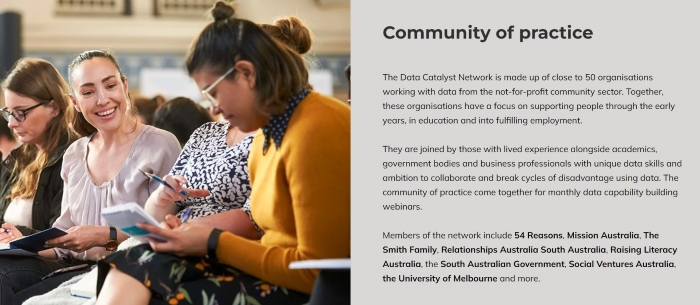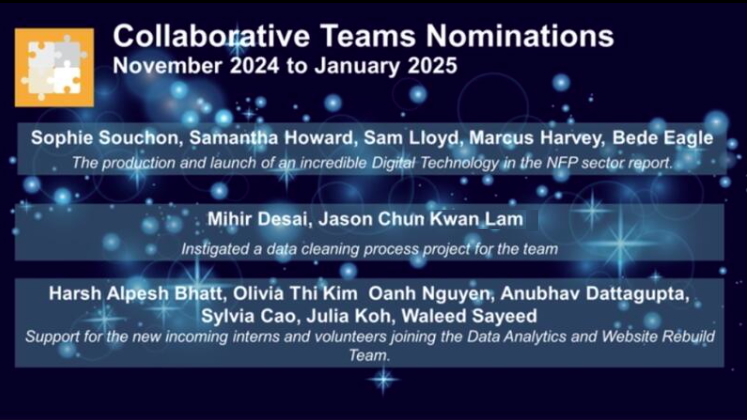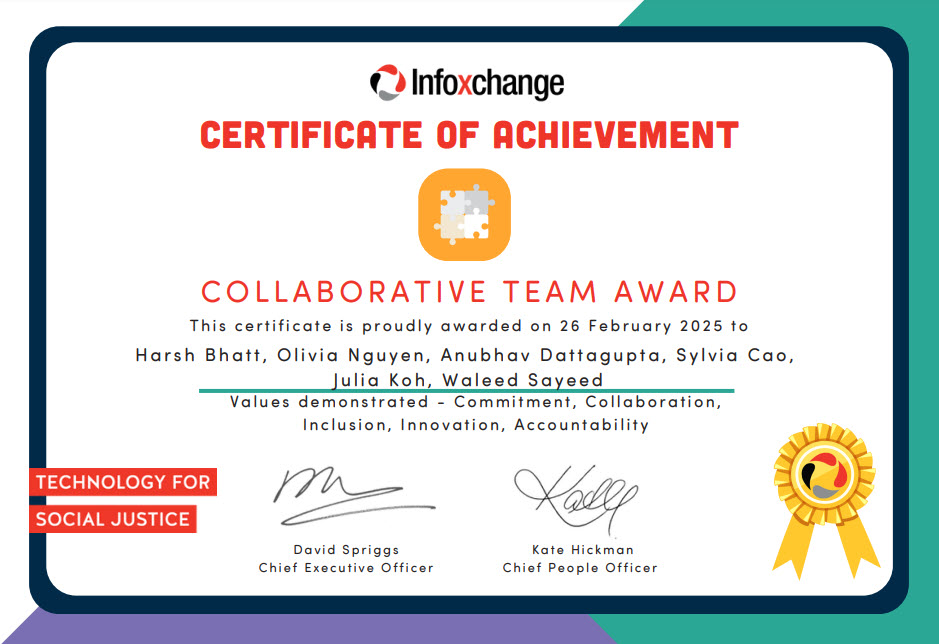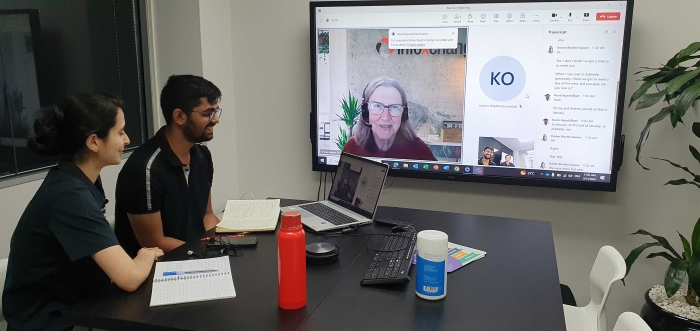Adelaide University Internship Experience - Harsh Bhatt

Welcome Harsh!
Harsh Bhatt joined our SAcommunity Data Analytics Team for his University of Adelaide SET (Sciences, Engineering and Technology) Internship for his Masters of Computer Science Trimester 1, 2024: 23 January 2024 - 23 June 2024.
He completed a 280 hour internship onsite with SAcommunity at the Connecting Up Office, Infoxchange for 3 days (22.5 hours) a week for ~14 weeks around his classes finishing his internship on the 10 May 2024.
We were fortunate to have Harsh return to our organisation as a volunteer on the 2 July 2024 after graduating. Assisting the organisation and taking on the Acting SAcommunity Data Analytics Lead/Overall Data Analytics Lead role for 4 hours once a week over July, August and September whilst current SAcommunity Data Analytics Lead Stathis Avramis is on leave, to assist new volunteers while he searches for work or a graduate opportunity in the data analytics field. Thank you for your help Harsh!
We are excited to announce that Harsh has a new position as a Data Analyst at Splose, a software company providing healthcare practice management software from 4 November 2024. Congratulations on your new role!
Total Hours 341 Joined 23 January 2024 Last Check-in 30 October 2024 (Retired)
 Induction Day 13 August 2024
Induction Day 13 August 2024
Former Interns now Volunteers: Harsh (Data Lead) along with assistants Olivia, Mostafa, Anju and Volunteer Alice and Anubhav (not pictured) help with the new group of volunteers and interns.
Personal Biography
Harsh completed his Masters of Computer Science at The University of Adelaide in 2024, following his Bachelors in Computer Engineering at SVIT in India and discovering that he has interests in data and other similar fields. He has previous intern experience in Data Analysis and has interests in Machine Learning. During University breaks he provides soccer coaching for kids and volunteers for the University School Holiday Program organized by The University of Adelaide.
He is currently working on is his research project using Segment Anything Model (SAM), a Segmentation Model from META, and combining it with YOLOv8, a model used for object detection, tracking and object counting in an image or video file. He is also Interning at Connecting Up where he aims to gain practical and real-world experience, and to leverage his skills, and acquired knowledge to land a job in his desired field.
In the future following his key interests in Data, he aims to work as a Data Specialist. He also plans to combine his interests in Data and soccer working as a Performance Analyst assisting the team by reviewing statistics of an individual athlete to provide further insights on the game.

Community Services in Councils Project
Harsh has selected The City of Salisbury for his Power BI council reports, a database of approximately 551 community services operating in the area for the financial years 2021-2022 and 2022-2023. His reports followed previous visualisation report work by Stathis Avramis, and his completed reports can be found >>here.
There are a number of steps involved in the creation of community service information data presentations. A summary of data trends prepared, using information from Google Analytics and SAcommunity with subsequent Power BI and Canva reports revealing data anomalies and corrections required, the database is updated and reports re-created with improved information. Final data reports are published to the website, and introduced by Harsh to Salisbury council stakeholders for information and/or feedback on 28 February 2024 and were followed up on 6 March 2024.
Harsh also selected the District Council of Karoonda East Murray following up on Jordana's previous work with the council, and his completed reports can be found >>here.

Harsh Bhatt demonstrating his dashboard to Intern Yi Han (left) and Volunteer Frank Xiufeng Shi (right)
Python Coding
Some of the key projects/tasks Harsh undertook towards this project are outlined below:
Harsh worked with fellow intern Violet Zewei You as they initiated their own project to make this process more efficient and effective for the team, by using Python script for automating the retrieval of landing page session data from Google Analytics Universal and making this available in GitHub.
Council Contact
Harsh contacted Salisbury Council on the 28 February 2024 and followed up on 6 March 2024 by email and by phone to raise awareness of the SAcommunity service with potential stakeholders, that is council staff working in community consultation or community development areas, to present his publicly available data reports which can be used as another tool to understand their community needs in the area.
Dashboard Project
Harsh also independently created a dashboard summary of all preceeding four years of community service information in Salisbury for comparison (above). He then produced a capacity building video for his peers on 20 March 2024 using Camtasia and provided a Power BI template to assist other volunteers and interns in the Data Analytics Team to re-create this dashboard for their council projects.
Microsoft Pro Account
Harsh also introduced and summarised some of the benefits of the Microsoft Pro licence for Data Analytics Team members to assist them in their learning journey available >>here

Connecting Up Monthly Meeting 12 March 2024
Work experience - Internal and External Events, Connections and Networks
Organisation-wide news, events and projects are communicated through the staff channels, with weekly CEO Updates from David Spriggs. Informal 'Lunch and Learn' educational sessions, and network meetings create connections with staff. Whilst peer-to-peer training or capacity building and telephone techniques training allow for networking with other volunteers.
Interns are also given opportunities to attend stakeholder and partner events as they arise.
Relevant meetings and training sessions Harsh has attended include:

Training and Development - Telephone Techniques

Connecting Up Monthly Staff Meetings
13 February 2024
Introduction to Jo Davies the COO of Infoxchange

CU Meeting 12 March 2024 & 9 April 2024 (internship) 13 August 2024 (Volunteer)
Updates from the Connecting Up Team includes monthly highlights, plans, activities

Infoxchange (IX) All Staff Town Hall Meeting 27 February 2024
Updates from the Infoxchange CEO, Operations, Finance, People & Culture, Lightning Talks from IX Teams, & IXcel Awards


Interns Violet Zewei You, Harsh Bhatt and Volunteer Kane Hengchuan Zhao looking at the Data Analytics Python program
IX Community & Cultural Events & Activities
Jo Davies Chief Operating Officer Infoxchange & David Spriggs CEO Infoxchange
World Autism Month Key Speaker Jim Mullan CEO of Amaze 5 April 2024 An informative talk on Amaze, World Autism Month, Autistic inclusion in the workplace. Amaze is known for building autism understanding in the community, influencing policy change for Autistic people and their families / supporters, and providing independent, credible information and resources to individuals, families, professionals, government, and the wider community.

IX Stakeholder Events
Data Catalyst Network (DCN): Brings together people from across sectors, to break cycles of disadvantage through the innovative use of data.
Participants of the Data Catalyst Network will advance their data maturity while sharing and improving data insights through unique cross-sector partnerships to disrupt disadvantage. As a collective, the network will harness data and knowledge from the not-for-profit community sector, academia, government and business to better use and manage data to improve the lives of people across Australia.
DCN: Augmented Intelligence; Combining Organisation Data with Large Language Models 29 February 2024
Associate Professor Amir Aryani, Head of the Social Data Analytics Lab at Swinburne University presented this Data Catalyst Network Webinar/ meeting on Augmented Intelligence and talked about large language models and his perspective on the rise of Generative AI.
The talk starts by diving into the potential of integrating Large Language Models into the business. He then explained the potential benefits of the involvement of AI in business. But then he explained the potential risks of sending the companies official documents and data sheets to Generative AI public web server, which is easily accessible by many potential attackers. He also added that companies need dedicated staff to bridge the merger of business and Generative AI.
Another potential threat is that of AI Hallucination. They are basically incorrect or misleading results that are generated from these Generative AI model and then explained that how such an error can have devastating repercussions to business. Hence to deal with this problem in hand, he proposes Retrieval Augmented Generation (RAG). RAG is a process of retrieving relevant document chunks from external knowledge base to optimize the results of a large language model. With RAG, companies can get more focused and dedicated responses from large language models and provide the necessary security keeping the enterprise data safe.
Overall, I believe this talk from Professor Amir improved my understanding of the challenges and risks to integrating Generative AI Models into business. It also provides a solution to some of the existing problems, although still not proved that the use of RAG will solve all the problems, but it is one of the potential solutions that the companies can look up.
DCN: Indigenous Data Sovereignty 20 March 2024
Jim O’Shea Gumbaynggirr man from New South Wales and Chief Operating Officer at VACCHO, Victorian Aboriginal Community Controlled Health Organization Inc presented this webinar. Indigenous Data refers to information and knowledge, in any format or medium, which is about/affects Indigenous people both collectively and individually. Whereas Indigenous Data Sovereignty refers to the right of Indigenous people over this data.
Mr O'Shea then discussed the different frameworks and principles that each organization must take into consideration for the development of Indigenous Data Sovereignty. He also highlighted the challenges that these communities face in the use of their data. Overall, this talk was an eye opener for a new area which every organization must follow and how proactively implementing these steps for Indigenous Data Sovereignty can benefit different communities.
DCN: Tools to get control of your data 24 April 2024
The Benevolent Society & Microsoft talk about Fabric
Volunteers and interns both prepare 5 questions for their mentors and then are encouraged to record 5 aspects they felt were helpful for them to share on their portfolio for both themselves and other volunteers, and Harsh shared his experience in meeting Kristen Moeller-Saxone Data Capability Lead, Infoxchange.

Volunteers and interns have access to the Connecting Up Digital Learning Platform providing live webinars and recorded webinars, workshops and webcons presented by subject-matter experts to understand more about a range of technology topics for the not-for-profit sector.
Relevant training sessions were selected, attended, summarised and assessed by Harsh to look at how these sessions can enhance his internship experience have included:
A Practical Introduction to Power BI
The not-for-profit sector is under constant pressure to do more with less resources, funding has been reduced and government services have been shifted to the NFP sector. In addition, the traditional sources of funding are shifting and stakeholders (government and investors) want to see the impact of their investments.
Power BI can be used as a tool to help with visualizing an organisation's productivity and results, making it easier for everyone in the organisation to look at, analyse, and comment on the work done. The Data Refresh Rate means we can also include real time streaming data, as well as access data in a large dataset, and ask questions in natural language, with the system able to provide insights based on our questions.
Power BI is also not strictly bound to any particular platform, as part of the Office365 suite it can be worked on from laptops, mobiles, tablets. One of the more interesting things I found about Power BI is that it can also support datasets in different formats like csv, excel, etc. These datasets can be combined, worked on individually, or operated on together by linking the datasets, providing a powerful tool for analysis.

Data reporting, business intelligence and outcomes to enhance services
This webinar started with providing the technologies that Infoxchange offers to transform any NFP organisations including: Case studies, digital guides, training resources, expert advice, etc. It then explained the 5 key domains of any organisation: 1. Tech Foundations, 2. Information Systems, 3. Digital Marketing, 4. IT Management, 5. Cybersecurity.
I found it of interest to see how the tone of the webinar shifted towards how we can make the most use of data. They then started demystifying data science and the core talents of any data projects. The core talents of the data projects being: 1. Project management 2. Data wrangling 3. Data analysis 4. Subject expertise 5. Design 6. Storytelling.
The webinar covered the different sources the data comes from in any NFPs and how to use the data more effectively and efficiently. It was useful to see how they explained how the use of data can be divided into 4 different parts, 1. Learn + Optimise: Here we do all the predictive analysis to target the CRM 2. Report + Visualise: We create an insightful report that captures what story the suthor is trying to convey 3. Process + Explore: In this step they talked about the different approaches that we can take to solve a particular problem and finally 4. Collect + Store: Getting the data from different data sources. They ended this webinar by demonstrating the efficiency and effectiveness of Power BI and how easily we can create insights with both Power BI and Tableau.


Data Loss Prevention (DLP) with Microsoft: Protecting Sensitive Data
Harsh Alpesh Bhatt Certificate of Completion >>here
In today's digital landscape, safeguarding sensitive data is paramount for any organization. Microsoft's Data Loss Prevention (DLP) solutions offer a robust set of tools and services to address this challenge effectively, and it was interesting to find out more about this area.

Consequently, there are different Ethical Considerations which we must keep in mind when working with Generative AI and other Large Language Models which are Bias, Safety, Transparency, Accountability and Privacy.

Interns: Harsh, Violet Zewei You, Volunteer Rex Porter, Intern Yi Han, Head of Connecting Up Pankaj Chhalotre and Intern Anju Odedara
Engaging in stakeholder events like the Data Catalyst Network webinars exposed me to emerging trends like augmented intelligence and deepened my understanding of data ethics. Training sessions organized by Connecting Up further honed my data management and analytics expertise, covering tools like Power BI, Excel, Google Analytics, and IT management.
Mentorship from Kristen Moeller-Saxone, Infoxchange's Data Capability Lead, provided invaluable guidance. Overall, this internship has equipped me with the confidence and skills to pursue a career as a data analyst, ready to make meaningful contributions to organizations aiming for data-driven decision-making and positive social impact.

 IXcel is Infoxchange's Reward and Recognition program open to nominations throughout the year for all employees and volunteers. Harsh was nominated for his work in the Collaborative Teams category for his leadership in supporting the new interns and volunteers joining the Data Analytics Team over 2024. This award recognises cross team collaboration to achieve agreed business outcomes leveraging the power of teamwork.
IXcel is Infoxchange's Reward and Recognition program open to nominations throughout the year for all employees and volunteers. Harsh was nominated for his work in the Collaborative Teams category for his leadership in supporting the new interns and volunteers joining the Data Analytics Team over 2024. This award recognises cross team collaboration to achieve agreed business outcomes leveraging the power of teamwork.
Sign up for the newsletter!
Subscribe to our monthly newsletter to receive news, information and events for the community sector in SA.





